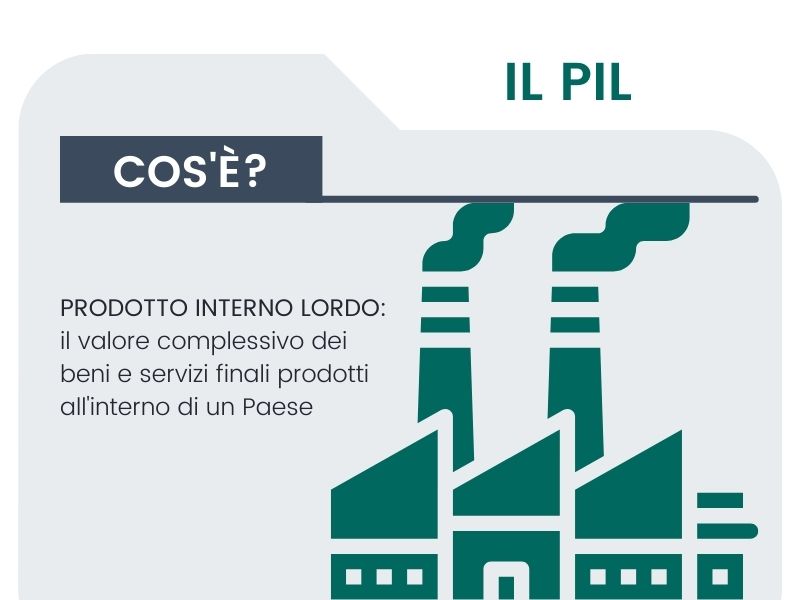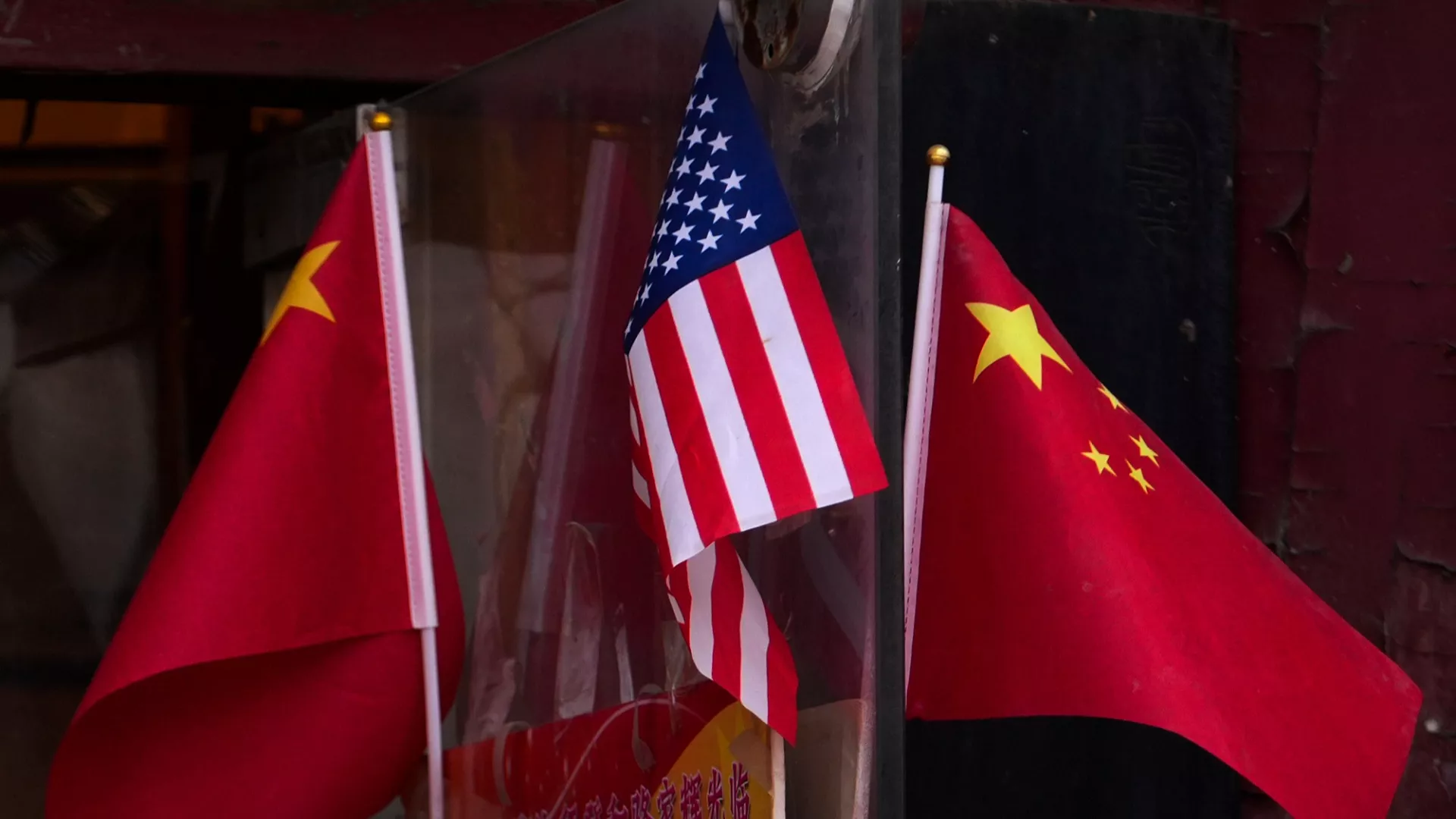
Beijing responds to Trump’s tariffs by vowing to fight ’till the end’
US President Donald Trump launched a trade war against China, alongside Mexico and Canada, by doubling the tariff he slapped last month on Beijing’s products to 20%.
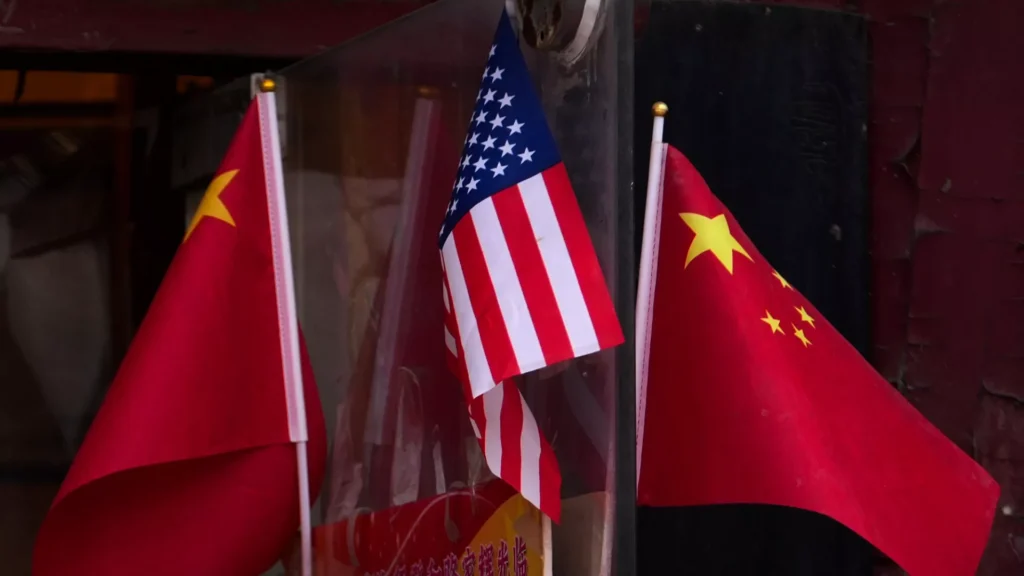
The Chinese Embassy in the US reiterated Beijing’s promise on Wednesday to “fight till the end” in response to US President Donald Trump slapping 20% tariffs on Beijing’s products.
Trump doubled the 10% tariff he imposed on China last month following a lengthy speech in Congress on Tuesday, which he said could cause “a little disturbance”.
“If war is what the US wants, be it a tariff war, a trade war or any other type of war, we’re ready to fight till the end,” the Chinese Embassy said on X, quoting the country’s foreign ministry.
Beijing has retaliated with levies of up to 15% on a wide range of key US farm products, including chicken, pork, soy and beef.
It has also placed 10 more US companies on its reliable entity list, which bars them from engaging in China-related import or export activities and making new investments in the US.
“Intimidation does not scare us. Bullying does not work on us. Pressuring, coercion or threats are not the right way of dealing with China,” a spokesperson for the foreign ministry asserted.
China’s tariffs will take effect next Monday, whilst Trump’s levy increase took hold as of Tuesday.
Beijing also hit back against Trump’s longstanding claim that China’s involvement in the fentanyl crisis was the reason for the tariff hike.
The US has accused Chinese corporations of supplying groups involved in the creation of the powerful drug responsible for the most opioid overdose deaths in the US.
Beijing responded by saying that the fentanyl crisis was a “flimsy excuse to raise US tariffs on Chinese imports.”
The US was responsible for the crisis inside its borders, China’s foreign ministry said, adding that it had taken “robust steps” to assist Washington in dealing with the issue.
“They’ve been punishing us for helping them,” Beijing said.
On Tuesday, Trump also brought Canada and Mexico — two of the US’ biggest trading partners alongside China — into a trade war by imposing a 25% tariff on Mexican and Canadian imports shortly after midnight.
“You have to bear with me again and this will be even better,” The US president told Congress.
Both Canadian Prime Minister Justin Trudeau and Mexican President Claudia Sheinbaum have announced their countries will respond in kind.
Trudeau slams Trump tariffs on Canada as ‘a very dumb thing to do’
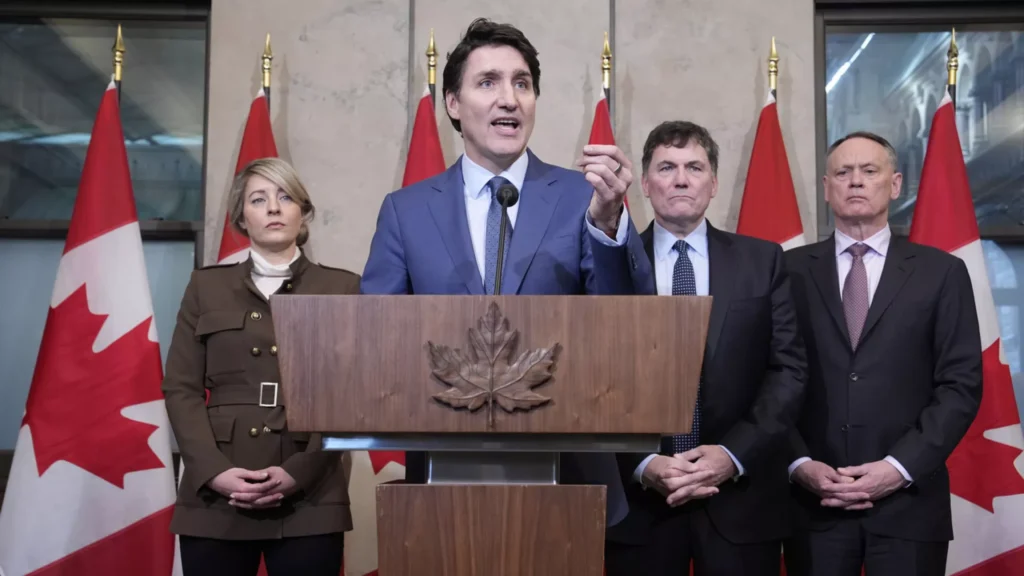 US President Donald Trump said he would proceed with planned tariffs on Canada, Mexico and China, causing a broad sell-off in US stock markets.
US President Donald Trump said he would proceed with planned tariffs on Canada, Mexico and China, causing a broad sell-off in US stock markets.
Canadian Prime Minister Justin Trudeau slammed tariffs announced by US President Donald Trump – describing them as a “very dumb thing to do.”
“Today the United States launched a trade war against Canada, their closest partner and ally, their closest friend. At the same, they are talking about working positively with Russia, appeasing Vladimir Putin, a lying, murderous dictator. Make that make sense,” Trudeau said.
“Now, it’s not in my habit to agree with the Wall Street Journal, but Donald, they point out that even though you’re a smart guy, this is a very dumb thing to do. We two friends fighting is exactly what our opponents around the world to see.”
Trudeau’s comments come after Trump launched a trade war against America’s three biggest trading partners in Canada, China and Mexico. Canada and Mexico face 25% tariffs on their goods, while China will be levied 20% on imports.
The move sparked immediate retaliation and sent global stock markets into a tailspin as the US faces inflation and financial uncertainty for business.
Trudeau announced that his nation would impose 25% tariffs on C$155 billion (€102.1 billion) worth of US goods, with tariffs on C$30 billion (€19.8 billion) of imports coming into effect on Tuesday and the remainder in 21 days.
“Our tariffs will remain in place until the US trade action is withdrawn, and should US tariffs not cease, we are in active and ongoing discussions with provinces and territories to pursue several non-tariff measures,” Trudeau said in a statement.
In a post on social media app Truth Social, Trump warned that “when (Trudeau) puts on a retaliatory tariff on the US, our reciprocal tariff will immediately increase by a like amount.”
Mexican President Claudia Sheinbaum said her nation would respond to the new taxes with its own retaliatory tariffs. Sheinbaum said she will announce the products Mexico will target on Sunday in a public event in Mexico City’s central plaza, with the delay potentially signalling hopes to de-escalate the trade war set off by Trump.
China signalled it would impose additional tariffs of up to 15% on imports of key US farm products, including chicken, pork, soy and beef, and would further restrict business with US companies.
Beijing is “strongly dissatisfied” with US tariffs, the Chinese Ministry of Commerce said in a statement, warning it would “take countermeasures to safeguards its rights and interests.”
As he promised voters, the US president is abandoning the free trade policies the United States pursued for decades after World War II. Trump argues that open trade cost America millions of factory jobs and that tariffs are the path to national prosperity. He rejects mainstream economists who contend that such protectionism is costly and inefficient.
Import taxes are “a very powerful weapon that politicians haven’t used because they were either dishonest, stupid or paid off in some other form,” Trump said Monday at the White House. “And now we’re using them.”
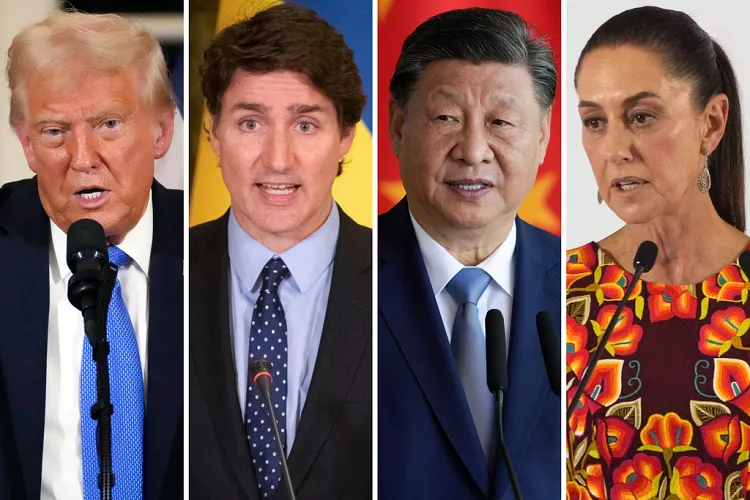
US President Donald Trump said he would proceed with planned tariffs on Canada, Mexico, and China, causing a broad selloff in US stock markets.
Global stock markets slumped following Trump’s announcement that he would proceed with 25% tariffs on Canada and Mexico, alongside additional 10% levies on Chinese imports.
The three countries responded with retaliatory measures, increasing fears of an escalating global trade war.
Responses from Canada and China
Canadian Prime Minister Justin Trudeau announced that Canada will impose 25% tariffs on C$155 billion (€102.1 billion) worth of US goods, with tariffs on C$30 billion (€19.8 billion) of imports coming into effect on Tuesday and the remainder in 21 days.
“Our tariffs will remain in place until the US trade action is withdrawn, and should US tariffs not cease, we are in active and ongoing discussions with provinces and territories to pursue several non-tariff measures,” Trudeau said in a statement.
China, meanwhile, signalled that it would impose additional tariffs of up to 15% on imports of key US farm products, including chicken, pork, soy and beef, and would further restrict business with US companies.
China’s Ministry of Commerce had released an earlier statement saying that Beijing was “strongly dissatisfied” with US tariffs and would “take countermeasures to safeguard its rights and interests”.
In February, China already imposed a 15% levy on coal and liquified natural gas (LNG) from the US and a 10% duty on American crude oil, farm equipment, and certain vehicles, following the Trump Administration’s initial 10% duty on China’s imports.
Last month, Trump also signed a memorandum directing the Committee on Foreign Investment to curb Chinese investment in the US.
On Tuesday, Mexico’s President Claudia Sheinbaum said she would announce Mexico’s retaliatory tariffs against the US on Sunday.
The leader reiterated that Mexico would cooperate with the US but not be subordinate.
European markets surge
Risk-aversion sentiment dominated global market trends, sending US stock markets sharply lower.
The tech-heavy index Nasdaq slumped 2.6%, erasing all the gains since Trump’s victory in the election.
The US dollar weakened against most other major currencies due to a slump in the US government bond yields.
However, the Canadian dollar and the Mexican Peso declined sharply against the greenback.
US government bonds, or Treasuries, are considered safe-haven assets and bond prices move inversely with bond yields. Other haven assets, including gold and the Japanese Yen, have all experienced strong gains.
In contrast to declines in US stock markets, European equities continued their record-breaking rally, with both the Euro Stoxx 600 index and Germany’s DAX hitting new highs on Monday.
Defence stocks soared, boosting the industrial sector in the bloc. Shares in Rheinmetall AG surged 13.7%, Airbus rose 5.9%, and BYYER AG climbed 5.7% after UK Prime Minister Keir Starmer met Ukrainian President Volodymyr Zelenskyy in London.
Starmer pledged to work with Ukraine on a strategy to end the war, increasing the likelihood of higher military spending in Europe.
European indexes such as the Stoxx 600, the DAX, and the CAC 40 nonetheless showed marginal declines on Tuesday morning.
Rise for the euro and bond yields
The euro, meanwhile, strengthened at the start of the week as most European government bond yields rose following hotter-than-expected February inflation data, complicating the European Central Bank’s (ECB) outlook on aggressive rate cuts.
On Monday, Germany’s 10-year Bund yield climbed 10 basis points, contrasting with a 9 bps drop in the 10-year US Treasuries. EUR/USD surged by nearly 1 cent, surpassing 1.0480.
Bitcoin retreated to just under $84,000 (€80,100) at 07:20 CET on Tuesday from Monday’s high above $94,000 (€89,600), mirroring the broad sell-off in technology shares.
The world’s largest digital token experienced a short-lived surge after Trump posted on Truth Social that he would “move forward on a Crypto Strategic Reserve” and “make sure the US is the Crypto Capital of the World”.
Mexico will react to Trump tariffs on Sunday, President Sheinbaum says
Mexico’s President Claudia Sheinbaum said her government would announce retaliatory tariffs against the US on Sunday, moving slower than China and Canada in response to Trump’s new trade policies.
Mexico’s president said on Tuesday that the country will respond to the 25% tariffs imposed by the United States with retaliatory tariffs on US goods, with details to come.
Mexico is set to announce the products it will target, along with other measures, at an event on Sunday in Mexico City’s central plaza.
The delay suggests Mexico hopes to de-escalate the trade war instigated by US President Donald Trump.
President Claudia Sheinbaum signalled that her government is “going to wait” because she planned to speak to Trump this week, although Mexico has said since January that it’s preparing for US tariffs.
“There is no motive or reason, nor justification that supports this decision that will affect our people and our nations,” Sheinbaum added.
China and Canada responded immediately to US tariffs with their own measures on Tuesday.
US could work out a deal with trade partners
After stock markets took a hit on Tuesday, US Secretary of Commerce Howard Lutnick said in a video posted to X that he was on the phone “all day” with Mexican and Canadian authorities.
Lutnick said it appeared the government was going to “work something out” with the trade partners. A deal could be announced on Wednesday.
“It’s not going to be a pause. None of that pause stuff,” he said. “Somewhere in the middle will likely be the outcome.”
Some 80% of Mexico’s exports go to the United States, part of more than $800 billion (€747.7bn) in trade between the countries last year.
Sheinbaum commented on White House allegations that Mexican drug traffickers persist because of “an intolerable relationship” with the Mexican government.
Trump has said he’s targeting Mexico to force it to crack down on migrants and drugs entering the US.
Sheinbaum listed the achievements of her administration against Mexico’s drug cartels, including seizing more than a ton of fentanyl and dismantling 329 methamphetamine labs.
She also noted that Mexico sent the US 29 drug cartel figures it requested last week.
“It’s inconceivable that they don’t think about the damage this is going to cause to United States citizens and businesses,” Sheinbaum said.
“No one wins with this decision,” she added.
Risk to inflation
Mexico’s president also noted that Trump on Monday said he respected her, and she said she respected him as well: “The thing is finding a way to collaborate, of coordinating without subordinating anyone for the benefit of our people.”
Trade experts expressed doubt over how long Trump’s tariffs would last, saying they would boost prices for American consumers, including Trump’s base.
“It is going to do nothing to help with the food inflation in the US,” Timothy Wise, an expert on agricultural trade between Mexico and the US, said.
“I don’t see it as sustainable. I don’t find it plausible that corporate folks who surround Trump are going to sit back and allow him to destroy their foreign markets.”
Gabriela Siller, economic analyst with Mexican financial group Banco Base, said in the short term, the tariffs could boost inflation, disrupt economic trade flows and slow economic growth for both countries.
But as she watched the gradually falling Mexican peso, she also noted “the exchange rate and volatility have not skyrocketed, as the market speculates that the US government could withdraw the tariffs soon”.
Mexico has the most to potentially lose in a trade war with the US, and economists say extended tariffs would plunge Mexico’s economy into a recession.
But for now, Sheinbaum’s approval ratings in Mexico are sky high.
She has fanned nationalist sentiment since before Trump took office, frequently invoking Mexico’s sovereignty, promising it will negotiate from a position of equals and pushing back on Trump’s name change of the Gulf of Mexico to the Gulf of America.
Sunday’s public event announcing Mexico’s retaliation will look to seize upon Sheinbaum’s popularity and the sense of national unity.
Still, that was little comfort to those whose livelihoods could be most affected.
‘Things could change drastically’
At the US-Mexico border, 58-year-old truck driver Carlos Ponce drove his truck packed with auto parts from Ciudad Juarez to El Paso, Texas, as he’s done for decades.
But he and many others along the border were holding their breath.
“Things could change drastically,” said Ponce, who worried that transporters like him could lose their jobs or have to drive longer distances to marine ports as Mexican manufacturers look for other trading partners.
Long lines of trucks marked the Ciudad Juarez border crossing ahead of the tariffs.
“There’s a lot of things that aren’t defined yet and I’m sure they’ll be rapidly redefined,” said Alan Russell, the head of Tecma, an American company that helps manufacturing businesses set up shop in places like Ciudad Juarez.
He expressed doubt over Trump’s narrative that the tariffs would push American companies to return to the US to set up factories: “Nobody is going to move their factory until they have certainty.”
Russell said just last week his company helped a new manufacturer that moved from North Carolina to Mexico because it was not able to find enough workers.
Manuel Sotelo, whose truck fleet moves products across the border every day, was shocked that tariffs went into effect after the steps Mexico’s president has taken to comply with US demands to crack down on cartels and fortify the border.
They include sending 10,000 troops to the border.
“Mexico made huge leaps and bounds,” said Sotelo, a Trump supporter who has a bobblehead doll of him on display in his office.
“I really did think yesterday afternoon or last night Trump would have reversed course.”
Trudeau to discuss Trump’s annexation threats with King Charles
The British monarch, who is Canada’s head of state, has been criticised for his silence on the issue.
Canadian Prime Minister Justin Trudeau is expected to bring up US President Donald Trump’s recent threats to annex Canada when he meets King Charles III on Monday.
Their meeting comes after some Canadians criticised the British monarch, who is Canada’s head of state, for failing to publicly respond to Trump’s comments.
Speaking in London on Sunday, Trudeau said the pair would discuss topics that Canadians deem important.
“Nothing seems more important to Canadians right now than standing up for our sovereignty and our independence as a nation,” he said.
Former Alberta Premier Jason Kenney defended the king over his public silence, noting that the monarch acts solely on the advice of Canada’s prime minister.
“The government of Canada should ask the head of state to underscore Canadian sovereignty,” he wrote on X.
Meanwhile, constitutional lawyer Lyle Skinner expressed his hope that Monday’s discussion would lead to “the king making a statement regarding his Canadian realm”.
However, experts remain divided on whether Trudeau will formally ask Charles to make a public statement.
Daniel Béland, a political scientist at McGill University, warned that it was a “highly delicate diplomatic matter”.
Not only could Trump be angered but a mistake could also “hurt the image and political legitimacy of the monarchy”, he added.
Béland suggested that Trudeau should speak with UK Prime Minister Keir Starmer first about Trump’s threats to make Canada the US’ 51st state.




